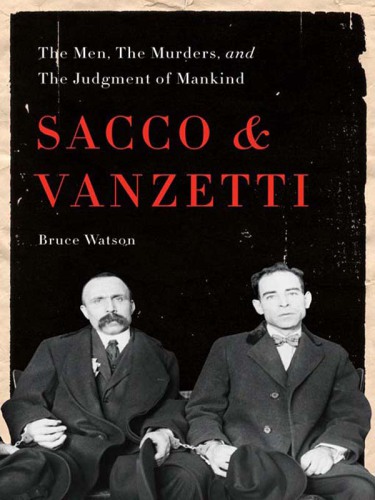
Sacco and Vanzetti
The Men, the Murders, and the Judgment of Mankind
- اطلاعات
- نقد و بررسی
- دیدگاه کاربران
نقد و بررسی

May 14, 2007
N
icola Sacco and Bartolomeo Vanzetti are among the most famous political martyrs of 20th-century America, convicted of murder by a Massachusetts jury and executed in 1929. Watson (Bread and Roses
) expertly runs through the facts of the case and the basic legal injustices perpetrated against the two men, beginning with their arrest on suspicion of a payroll robbery up to their electrocution, without agitating for either end of the political spectrum. He carefully establishes the context of anarchist terrorism that stirred public sentiment against the two admittedly radical defendants—including the judge at their trial, who made numerous prejudicial remarks outside the courtroom. Fellow radicals (and many moderate liberals) were outraged by the proceedings, but Watson observes that most Americans were too caught up in the “amusement park” mentality of the 1920s to care about them—a conclusion slightly at odds with the passionate debate to this day over their guilt. Watson quotes extensively from Sacco and Vanzetti's letters, with their imperfect English, to flesh out their personalities (he has also written an introduction to a new Penguin Classics edition of the correspondence). 16 pages of b&w photos.

Starred review from July 1, 2007
Why revisit the story of Sacco and Vanzetti 80 years after their execution for murder? Because issues raised by their case still resonate in today's world. After seven years of appeals, hunger strikes, and worldwide attention, Nicola Sacco and Bartolomeo Vanzetti were put to death following their controversial trial for the murder of two security guards during a daring daytime armed robbery in Massachusetts. Were they guilty? We may never know, but Watson clearly makes the case that they deserved nothing less than a second day in court. As immigrants and avowed anarchists, Sacco and Vanzetti were met with much prejudice from police and prosecutors. We are still grappling with how we treatand mistreatimmigrants, and we are still debating the death penalty and reopening cases to analyze DNA evidence to exonerate innocent defendants today. Journalist and author Watson ("Bread and Roses: Mills, Migrants, and the Struggle for the American Dream") has written a well-researched page-turner. Highly recommended.Karen Sandlin Silverman, CFAR (Ctr. for Applied Research), Philadelphia
Copyright 2007 Library Journal, LLC Used with permission.

June 1, 2007
The author of Bread & Roses (2005), a fine labor history about a 1912 strike, Watson here recounts the premier cause c'l'bre in American radicalism. If Watson has an opinion about the culpability of anarchists Nicola Sacco and Bartolomeo Vanzetti for a 1920 double murder in Massachusetts, he does not confide it to these pages, putting his skill toward narrating their legal ordeal and portraying their characters. Forever shackled together by their alleged crimes, they were quite contrasting personalities. Watson sketches the loner Vanzetti as a reader with a questing mind, and family-man Sacco as more emotional and less abstract. Both, though, were militants who had some explaining to do when arrested with guns and ammo. Meticulously tracking their trial, Watson extensively quotes its record as he dramatizes questionable aspects of the proceeding, such as conflicting witnesses and a prejudicial judge. Still, Sacco and Vanzettis alibis were not airtight, and, as Watson reminds readers, questions still remain about theirknowledge of anarchist terrorism thatrun parallel tohis able dramatization of the doubtful justice of their convictions and executions.(Reprinted with permission of Booklist, copyright 2007, American Library Association.)




دیدگاه کاربران